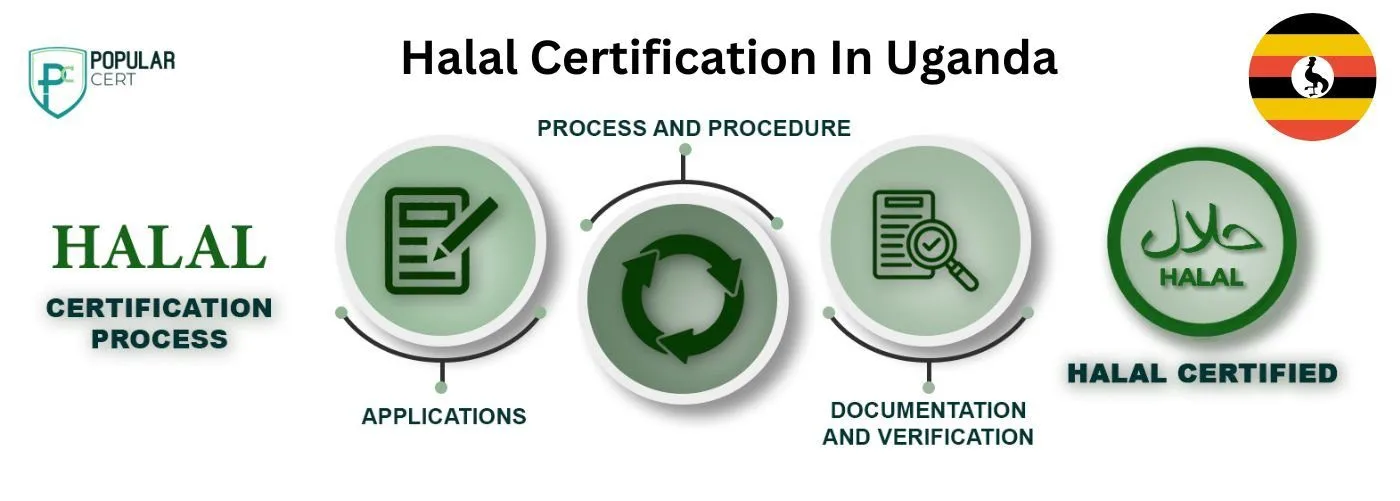halal certification in UGANDA
Get Free Consultation
PopularCert is a trusted provider of consulting services for Halal certification in Uganda, helping businesses align with global Halal standards. Our expert team supports organizations across diverse sectors, including food, cosmetics, and pharmaceuticals, ensuring compliance with Islamic dietary laws and consumer expectations. With a focus on quality, authenticity, and ethical practices, PopularCert simplifies the certification process by offering end-to-end guidance, from documentation to audits. Achieving Halal certification not only enhances market access locally and internationally but also strengthens brand reputation and customer trust. Partner with PopularCert to gain a competitive edge and expand your business in the Halal market.
Why Halal Certification is Important for You and Your Business in Uganda.
Halal certification is essential in Uganda as it ensures products and services comply with Islamic dietary and ethical standards, catering to the needs of the growing Muslim population. It signifies adherence to quality, hygiene, and lawful practices, boosting consumer confidence and trust. Halal certification opens access to local and international markets, particularly in Muslim-majority regions, enhancing trade opportunities. It also fosters inclusivity, allowing businesses to serve diverse customers while adhering to global standards. In Uganda’s expanding food, cosmetics, and pharmaceutical industries, Halal certification provides a competitive edge, ensuring compliance with regulations and meeting the expectations of conscious consumers worldwide.
How to Get Halal Certification in Uganda?

Process to Get Halal Certification In Uganda
Application Submission
Submit a detailed application to a recognized Halal certification body, including product details and manufacturing processes.
Document Review
The certification body reviews ingredients, sourcing, and processes to ensure compliance with Halal standards.
Facility Inspection
Conduct on-site audits to verify cleanliness, ingredient handling, and adherence to Halal practices.
Compliance Adjustments
Address any non-compliance issues identified during the inspection or document review.
Final Assessment
The certification body conducts a final evaluation of processes, documentation, and inspection reports.
Certificate Issuance
Upon successful completion, the business receives the Halal certificate, valid for a specific period.
Benefits of Halal Certification in Uganda
- Access to Global Markets : Halal certification opens doors to international markets where Muslim consumers prioritize Halal products. This provides businesses with the opportunity to expand their reach and cater to a growing global demand for Halal-certified goods.
- Consumer Trust and Loyalty : Halal certification builds trust among Muslim consumers who seek products that align with their religious and ethical values. Certified products gain credibility, leading to stronger customer loyalty and repeat purchases.
- Improved Quality Assurance : The certification process ensures that products meet stringent quality control standards, which enhances the overall quality of the product. Businesses must adhere to high hygiene and safety protocols, resulting in safer and more reliable products.
- Competitive Advantage : Being Halal-certified differentiates businesses in a competitive market, especially in regions with significant Muslim populations. It enhances brand image and demonstrates commitment to quality and ethical standards.
- Compliance with Regulations : Halal certification ensures that products comply with local and international regulatory standards for Halal products. This reduces the risk of legal issues and ensures businesses stay compliant with consumer protection laws.
Types Of ISO Certification In Uganda
- ISO certification in Uganda
- ISO 9001 Certification
- ISO 14001 Certification
- ISO 45001 Certification
- ISO 22000 Certification
- ISO 27001 Certification
- ISO 17025 Certification
- ISO 13485 Certification
- CE Mark Certification
- ISO 20000-1 Certification
- GMP Certification
- HALAL Certification
- SOC-1 Certification
- SOC-2 Certification
Get Free Consultation
Our Clients


















Cost of Halal Certification in Uganda
The cost of Halal certification in Uganda depends on the size of the organization, the complexity of its processes, and its current level of compliance with Halal standards. Typical expenses include gap analysis, training, documentation preparation, audits, and implementation support. PopularCert offers tailored and cost-effective solutions to help businesses in Uganda achieve Halal certification, ensuring compliance with Halal standards and enhancing product credibility in local and international markets.
Why Choose PopularCert For Halal Certification in Uganda?
PopularCert is a globally renowned consulting company specializing in certification, advisory, and auditing services. We are the trusted choice for organizations seeking Halal certification due to our experienced, ethical consultants and proven success record. For Halal certification in Uganda, choose PopularCert, a leader in consultancy, certification, and auditing services. Contact us, and our experts will promptly provide the best solution tailored to your needs.
GET A FREE CONSULTATION NOW
FAQ
What is Halal Certification?
Halal Certification ensures that products and services comply with Islamic laws and standards, making them permissible for Muslim consumers.
How to get Halal Certification?
- Step 1: Review your processes to ensure they align with Halal standards.
- Step 2: Make necessary changes in sourcing, production, and handling to comply with Halal guidelines.
- Step 3: Submit your application to an accredited Halal Certification body.
- Step 4: Undergo an inspection and audit to verify compliance.
What are the costs of Halal Certification?
The cost depends on your organization’s size, product range, and complexity. Contact PopularCert for a tailored cost estimate.
How does PopularCert assist with Halal Certification?
PopularCert provides end-to-end support, including gap analysis, documentation, training, and coordination with Halal certification bodies.
